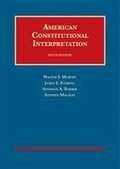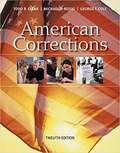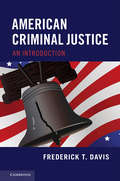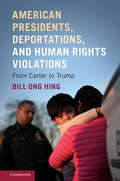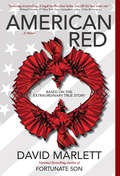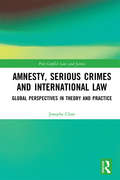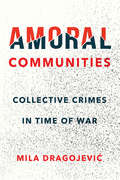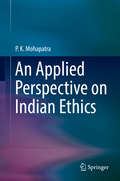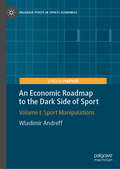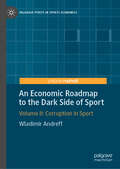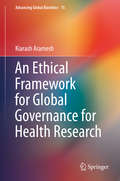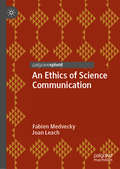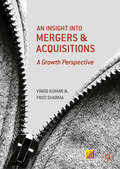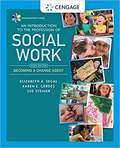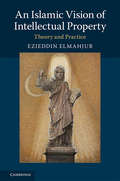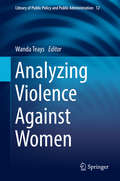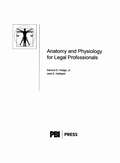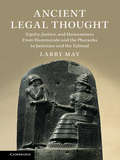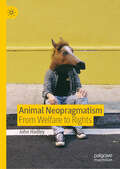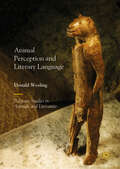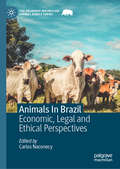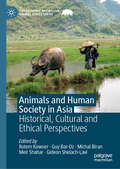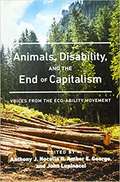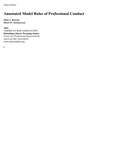- Table View
- List View
American Constitutional Interpretation (University Casebook Series)
by Sotirios A. Barber James E. Fleming Walter F. Murphy Stephen J. MacedoThis text uses original essays, cases, and materials to study the very enterprise by which a constitution is interpreted and a constitutional government created. It explores the American polity as both a constitutional and democratic entity. This volume is organized around a set of basic interrogatives: What is the constitution that is to be interpreted? Who are its authoritative interpreters? How should they go about their interpretive tasks? The new edition has been updated to include important new cases decided through June 2018, including Masterpiece Cakeshop, Ltd. v. Colorado Civil Rights Commission and National Institute of Family and Life Advocates v. Becerra. To maintain brevity, the authors have removed a number of cases from the casebook and placed them on the accompanying website.
American Corrections (Mindtap Course List)
by George F. Cole Todd R. Clear Michael D. ReisigExplore the American corrections system from the perspective of both the corrections worker and the accused person in AMERICAN CORRECTIONS, 12th Edition. You'll learn about institutional and community sanctions, aided by high-profile corrections cases taken from recent headlines to reinforce important theories. The authors "tell it like it is" with thought-provoking, unbiased examinations of such topics as assisting felons during the re-entry process, reducing recidivism, the death penalty and surveillance. You'll also get a frontline view of careers in the corrections field.
American Criminal Justice: An Introduction
by Frederick T. DavisAmerican criminal justice may be one of the best known - and most influential - systems of criminal justice in the world, but also the least understood: countless films and television series portray American police officers, prosecutors and lawyers, but over 95 percent of criminal matters result in guilty pleas, and trials are becoming vanishingly scarce as people accused of crime choose to strike a deal with increasingly powerful prosecutors. Sentencing 'reform' has led to a burgeoning prison population that is by far the highest among economically advanced countries. Meanwhile, American prosecutors have gained increasing (and largely unchecked) power to apply US criminal laws to worldwide corporations and individuals with little or no connection with the country. American Criminal Justice: An Introduction provides a readable, comprehensive review of the American criminal process behind these and other problems.
American Presidents, Deportations, and Human Rights Violations: From Carter to Trump
by Bill Ong HingOf the many issues polarizing societies today, immigration is one of the most contentious. In the United States, as in Europe, immigration was a defining issue in recent national elections. Immigration not only involves government policies but also the human rights of millions of people. American Presidents, Deportations, and Human Rights Violations studies how recent immigration policies in the United States developed during the Obama administration and are now being expanded in the first months of the Trump presidency. Documenting the harsh treatment of immigrants over the past twenty years, Bill Ong Hing shows how mass detention and deportation of immigrants, from Clinton's two terms and the Bush administration, have escalated even higher. This book questions what price the United States is willing to pay for such harsh immigration policies in terms of our national values, and the impact on the lives of the millions of immigrants who deserve the full protection of universal human rights obligations.
American Red: A Novel
by David MarlettA union boss goes on trial for murder at the dawn of the twentieth century in this acclaimed historical legal thriller based on true events. When the governor of Idaho is assassinated in 1905, Pinkerton detective James McParland pins the crime on William &“Big Bill&” Haywood, the powerful boss of the Western Federation of Miners. As the trial begins, America&’s most famous attorney, Clarence Darrow, leads the defense; a philandering US senator leads the prosecution; and the courtroom is crowded with press, gunhands, and spies. Among those present are two young idealists, Jack Garrett and Carla Capone—he a spy for the prosecution, she for the defense. As they discover unsettling truths about their employers, they begin to discover what they&’re willing to sacrifice for justice, honor, and a chance at love. &“American Red is an unflinching depiction of mine owners&’ pursuit of profit at the expense of miners&’ safety, unions&’ routine use of violence to make workers&’ voices heard, a police force&’s willingness to resort to kidnapping and subterfuge and a court system&’s tug of war over constitutional protections, compassion and fairness.&” —Historical Novel Society
Amnesty, Serious Crimes and International Law: Global Perspectives in Theory and Practice (Post-Conflict Law and Justice)
by Josepha CloseAmnesty, Serious Crimes and International Law examines the permissibility of amnesties for serious crimes in the contemporary international order. In the last few decades, there has been a growing tendency to consider that amnesties are prohibited in respect of certain grave crimes. However, the question remains controversial as there is no explicit treaty ban and general amnesties continue to be frequently issued in post-conflict and transitional contexts. The first part of the book explores the use of amnesties from antiquity to the present day. It reviews amnesty traditions in ancient societies and provides a global picture of modern amnesties. In parallel, it traces the development of the accountability paradigm underpinning the current prohibitive stance on amnesties. The second part assesses the position of modern international law on amnesties. It comprehensively analyses the main arguments supporting the existence of a general amnesty ban, including the duty to prosecute international crimes, the right to redress of victims of human rights violations, international standards and trends in state practice, and the mandate of international criminal courts. The book argues that, while international legal or policy requirements restrict the freedom of states to extend amnesty in respect of serious crimes, or the effectiveness of amnesty measures in preventing the prosecution of such crimes, these restrictions do not add up to an absolute and universal prohibition.
Amoral Communities: Collective Crimes in Time of War
by Mila DragojevićIn Amoral Communities, Mila Dragojević examines how conditions conducive to atrocities against civilians are created during wartime in some communities. She identifies the exclusion of moderates and the production of borders as the main processes. In these places, political and ethnic identities become linked and targeted violence against civilians becomes both tolerated and justified by the respective authorities as a necessary sacrifice for a greater political goal.Dragojević augments the literature on genocide and civil wars by demonstrating how violence can be used as a political strategy, and how communities, as well as individuals, remember episodes of violence against civilians. The communities on which she focuses are Croatia in the 1990s and Uganda and Guatemala in the 1980s. In each case Dragojević considers how people who have lived peacefully as neighbors for many years are suddenly transformed into enemies, yet intracommunal violence is not ubiquitous throughout the conflict zone; rather, it is specific to particular regions or villages within those zones. Reporting on the varying wartime experiences of individuals, she adds depth, emotion, and objectivity to the historical and socioeconomic conditions that shaped each conflict.Furthermore, as Amoral Communities describes, the exclusion of moderates and the production of borders limit individuals' freedom to express their views, work to prevent the possible defection of members of an in-group, and facilitate identification of individuals who are purportedly a threat. Even before mass killings begin, Dragojević finds, these and similar changes will have transformed particular villages or regions into amoral communities, places where the definition of crime changes and violence is justified as a form of self-defense by perpetrators.
An Applied Perspective on Indian Ethics
by P. K. MohapatraThis book presents a novel interpretation of major problems of Indian ethics from an applied ethical perspective. It approaches prominent theories like Dharma, Karma and Purusarthas from a critical point of view, so as to render them logically consistent and free from some standard limitations. Ethical theories are meant to provide guidance for life, but quite often many of our celebrated theories appear to be inapplicable or difficult to apply in practical life. Indian ethical theories are of special significance to this problem because they have in them rich potentials of applicability as much as many of them typify inapplicable abstract theories of morals. The book incorporates a wealth of research on ethical theories, keeping in view the spirit of ethics and the demands of the situations; for a reasoned balance between the two is the key to applied ethics. The book argues that ethical theories are objective but defeasible in overriding circumstances where competing values deserve preference. Such justified exceptions are warranted by the very spirit of ethics, which is to promote the good life. The argument from defeasibility and justified violation in the book helps bridging the gap between ethics and its application and makes Indian theories of value appear in fresh light- workable, practically applicable and effective as incentives for morality. With uncommon virtue of contemporized presentation of Indian ethics, this book should be of interest to scholars and researchers working on Indian ethics and moral philosophy, as well as to those interested in Indian culture and value tradition.
An Economic Roadmap to the Dark Side of Sport: Volume I: Sport Manipulations (Palgrave Pivots in Sports Economics)
by Wladimir AndreffThis Palgrave Pivot provides a comprehensive overview of economic aspects to criminal behaviour in sport. It addresses manipulations, dysfunctions, distortions and crimes triggered by economic interests or pure greed in sports, and challenges the governance of this important industry. Topics covered include hazing, sabotage, refereeing bias, technological manipulations, tanking, bad management, financial doping, ticket touting, circumventing the law through sport, discrimination and child labour.The book is divided into three volumes. Volume I covers those economic manipulations that breach sports rules, sporting integrity, violate managerial rules and the law, and infringe human rights in sport. It builds up a typology of sport manipulations which makes sense from an economic standpoint, not only from a sporting or judicial perspective.Volumes II and III (available separately) focus on Corruption and Economic Crime in Sport, respectively.This book will be of interest to students, researchers and journalists in sports science, sports management and sports economics.
An Economic Roadmap to the Dark Side of Sport: Volume II: Corruption in Sport (Palgrave Pivots in Sports Economics)
by Wladimir AndreffThis Palgrave Pivot surveys facts and cases exhibiting and exemplifying corruption in sport. The standard economic theory (economics of crime, game theory) is introduced alongside the economic methods (sanctions, etc.) which are currently derived from it to combat corrupt sport and their limitations. The complexity and multidimensional nature of sports corruption are examined, and a focus is applied to certain types of corruption that are unique to the sports industry. Corruption is revealed to be the outcome of weak and deficient governance structures. The book is divided into three volumes. Volume II presents a variety of corruption facts in different sports, in different countries and continents in order to exhibit how much corrupt sport is globalised. Some changes in governance are suggested that may pave the way to more effective combat against corruption in sports. Volumes I and III (available separately) address Sport Manipulations and Economic Crime in Sport, respectively. This book will be of interest to students, researchers and journalists in sports science, sports management and sports economics.
An Ethical Framework for Global Governance for Health Research (Advancing Global Bioethics #15)
by Kiarash ArameshThis book provides a comprehensive description and ethical analysis of one of the most challenging areas: international health research. Furthermore, it provides a vivid portrait of the current situation of global governance for health research and its main challenges and suggests a comprehensive and universal ethical framework based on the existing theories and frameworks. This work is a must-read for all the students, scholars, professionals, activists, and policy-makers who are involved or interested in the global health research enterprise and its governance and ethics.
An Ethics of Science Communication
by Fabien Medvecky Joan LeachThis book presents the first comprehensive set of principles for an ethics of science communication. We all want to communicate science ethically, but how do we do so? What does being ethical when communicating science even mean? The authors argue that ethical reasoning is essential training for science communicators. The book provides an overview of the relationship between values, science, and communication. Ethical problems are examined to consider how to create an ethics of science communication. These issues range from the timing of communication, narratives, accuracy and persuasion, to funding and the client-public tension. The book offers a tailor-made ethics of science communication based on principlism. Case studies are used to demonstrate how this tailor-made ethics can be applied in practice.
An Insight into Mergers and Acquisitions: A Growth Perspective
by Vinod Kumar Priti SharmaThis book provides an insight in the phenomenon of Mergers and Acquisitions (M&A), including the various forms of corporate restructuring. It highlights the importance of M&A as a strategy for faster growth in the corporate. The book provides an enriched experience of the art of valuation with detailed description of M&A process, deal structuring and financing. The book also provides the broader perspective of Accounting and Regulatory aspects of M&A. While covering the conceptual underpinnings of M&A, the book supplements it with real life examples on each sub-topic with various numeric examples. Thus the judicious blend of theory and practical aspects, through numerical as well as real life case-studies, make the book a source of vast knowledge in the complicated and dynamic world of M&A.
An Introduction to the Profession of Social Work (Empowerment Series)
by Elizabeth A. Segal Sue Steiner Karen E. GerdesWhat does it mean to be a social worker? Get an overview of the social work profession and learn about the role of the social worker in the social welfare system with Segal, Gerdes and Steiner's text. <p><p> Through case studies, personal stories and exercises, AN INTRODUCTION TO THE PROFESSION OF SOCIAL WORK helps you apply concepts as well as understand what social workers do, what they need to know and the issues they face. Part of the Brooks/Cole Empowerment Series, the sixth edition is completely up to date. It also prepares you for a successful career by integrating the core competencies and recommended practice behaviors outlined in the most recent Educational Policy and Accreditation Standards (EPAS) set by the Council on Social Work Education (CSWE).
An Islamic Vision of Intellectual Property: Theory and Practice
by Ezieddin ElmahjubFor over a century, intellectual property (IP) regimes have been justified using Western philosophical theories rooted in the idea that IP must reward talent and maximize global stocks of knowledge and cultural products. Reframing IP in a context of legal pluralism, Ezieddin Elmahjub brings an Islamic and comparative narrative to the appropriate design and scope of IP rights, and in doing so criticizes the dominance of Western influence on a global regime that impacts the ability of people to access medicine, to read, to imagine, and to reshape popular culture. The Islamic vision of IP, which is based on a broad theory of social justice, maintains that IP cannot simply be seen as a reward for effort or tool to maximize economic efficiency but as one legal right within a complicated distributive scheme affecting fundamental human rights, equal opportunities, and human capabilities.
Analyzing Violence Against Women (Library of Public Policy and Public Administration #12)
by Wanda TeaysThis timely anthology brings into sharp relief the extent of violence against women. Its range is global and far reaching in terms of the number of victims. There are deeply entrenched values that need to be rooted out and laid bare.This text offers a philosophical analysis of the problem, with important insights from the various contributors. Topics range from sexual assault to media violence, prostitution and pornography, domestic violence, and sexual harassment. Each of the four parts include essays which tackle these issues and provide us with tools for bringing about change.The philosophical approaches to the topic give readers insight into the harms of interpersonal violence and its impact on the lives of its victims. Analyzing Violence Against Women calls us to examine public policies and work for systemic change. In the process, we are reminded that the concerns of the discipline of Philosophy encompasses issues with a wider scope.Students will especially benefit from seeing how the various authors grapple with this pressing issue and clarify why we need to bring about change.
Anatomy And Physiology For Legal Professionals
by Samuel D. Hodge Jack E. HubbardFrom one of the most popular continuing legal education instructors in the country, known for the interactive teaching style of his anatomy for lawyers courses, author Sam Hodge and co-author Jack Hubbard, MD, have written this essential guide. Covering all the systems of the body, from the skeletal system to the immune system and its disorders, this book gives lawyers a clear understanding of every facet of human anatomy affecting their client's case. The book includes more than 275 medical illustrations and examples of cases dealing with medical issues.
Ancient Legal Thought: Equity, Justice, and Humaneness From Hammurabi and the Pharaohs to Justinian and the Talmud
by Larry MayThis is a study of what constituted legality and the role of law in ancient societies. Investigating and comparing legal codes and legal thinking of the ancient societies of Mesopotamia, Egypt, Greece, India, the Roman Republic, the Roman Empire and of the ancient Rabbis, this volume examines how people used law to create stable societies. Starting with Hammurabi's Code, this volume also analyzes the law of the pharaohs and the codes of the ancient rabbis and of the Roman Emperor Justinian. Focusing on the key concepts of justice equity and humaneness, the status of women and slaves, and the idea of criminality and of war and peace; no other book attempts to examine such diverse legal systems and legal thinking from the ancient world.
Animal Neopragmatism: From Welfare to Rights
by John HadleyThis book affords a neopragmatic theory of animal ethics, taking its lead from American Pragmatism to place language at the centre of philosophical analysis. Following a method traceable to Dewey, Wittgenstein and Rorty, Hadley argues that many enduring puzzles about human interactions with animals can be ‘dissolved’ by understanding why people use terms like dignity, respect, naturalness, and inherent value. Hadley shifts the debate about animal welfare and rights from its current focus upon contentious claims about value and animal mindedness, to the vocabulary people use to express their concern for the suffering and lives of animals. With its emphasis on public concern for animals, animal neopragmatism is a uniquely progressive and democratic theory of animal ethics.
Animal Perception and Literary Language (Palgrave Studies in Animals and Literature)
by Donald WeslingAnimal Perception and Literary Language shows that the perceptual content of reading and writing derives from our embodied minds. Donald Wesling considers how humans, evolved from animals, have learned to code perception of movement into sentences and scenes. The book first specifies terms and questions in animal philosophy and surveys recent work on perception, then describes attributes of multispecies thinking and defines a tradition of writers in this lineage. Finally, the text concludes with literature coming into full focus in twelve case studies of varied readings. Overall, Wesling's book offers not a new method of literary criticism, but a reveal of what we all do with perceptual content when we read.
Animals In Brazil: Economic, Legal and Ethical Perspectives (The Palgrave Macmillan Animal Ethics Series)
by Carlos NaconecyThis book presents a collection of essays exploring the legal, economic, socio-environmental, and ethical dimensions of human-animal interaction in Brazil. As one of the primary global producers and exporters of beef, with a level of biodiversity in its rain-forests found nowhere else under threat, the importance of Brazil for animal life is unquestionable. Shedding light on the profound transformations in the consumption and production of animal-sourced foods that have taken place over the last five decades, the authors examine the consequences of this phenomenon for the lives of animals, the health of the population, and the environment. The book also offers an analysis of the animal welfare and animal protection legislation in Brazil, before presenting a number of notable cases involving animal advocacy and activism in recent years. An important and timely collection, this book concludes with an exploration of the historical, socio-cultural and economic aspects that influence the Brazilian ethos regarding the morality of the treatment of animals.
Animals and Human Society in Asia: Historical, Cultural and Ethical Perspectives (The Palgrave Macmillan Animal Ethics Series)
by Rotem Kowner Michal Biran Gideon Shelach-Lavi Meir Shahar Guy Bar-OzThis edited collection offers a comprehensive overview of the different aspects of human-animal interactions in Asia throughout history. With twelve thematically-arranged chapters, this book examines the diverse roles that beasts, livestock, and fish — real and metaphorical– have played in Asian history, society, and culture. Ranging from prehistory to the present day, the authors address a wealth of topics including the domestication of animals, dietary practices and sacrifice, hunting, the use of animals in war, and the representation of animals in literature and art. Providing a unique perspective on human interaction with the environment, the volume is cross-disciplinary in its reach, offering enriching insights to the fields of animal ethics, Asian studies, world history and more.
Animals in the Sociologies of Westermarck and Durkheim (The Palgrave Macmillan Animal Ethics Series)
by Salla TuomivaaraThis book explores why animals, at some point, disappeared from the realm and scope of sociology. The role of sociology in the construction of a science of the ‘human’ has been substantial, building representations of the human sphere of life as unique. Within the sociological tradition however, animals have often been invisible, even non-existent. Through in-depth comparisons of the texts of prominent early sociologists Emile Durkheim and Edward Westermarck, Tuomivaara shows that despite this exclusion, representations of animals and human-animal relations were far more varied in early works than in the later sociological cannon. Addressing a significant gap in the interdisciplinary field of animal studies, Tuomivaara presents a close reading of the historical treatment of animals in the works of Durkheim and Westermarck to determine how the human-animal boundary was established in sociological theory. The diverse forms in which animals and ‘the animal’ appear in the works of early classical sociology are charted and explored, alongside the sociological themes that bring animals into these texts. Situated in contemporary theory, from critical animal studies to posthumanism, this important book lays the groundwork for a disciplinary shift away from this sharp human-animal dualism.
Animals, Disability, and the End of Capitalism: Voices from the Eco-Ability Movement (Radical Animal Studies and Total Liberation #1)
by John Lupinacci Anthony J. Nocella Amber E. George<p>Animals, Disability, and the End of Capitalism is a collection of essays from the leaders in the field of eco-ability. The book is rooted in critical pedagogy, inclusive education, and environmental education. The efforts of diverse disability activists work to weave together the complex diversity and vastly overlooked interconnections among nature, ability, and animals. Eco-ability challenges social constructions, binaries, domination, and normalcy. Contributors challenge the concepts of disability, animal, and nature in relation to human and man. Eco-ability stresses the interdependent relationship among everything and how the effect of one action such as the extinction of a species in Africa can affect the ecosystem in Northern California. Animals, Disability, and the End of Capitalism is timely and offers important critical insight from within the growing movement and the current academic climate for such scholarship. The book also provides insights and examples of radical experiences, pedagogical projects, and perspectives shaped by critical animal studies, critical environmental studies, and critical disability studies. <p>Contributors include Sarah R. Adams, Marissa Anderson, Judy K. C. Bentley, Mary Fantaske, Amber E. George, Ava HaberkornHalm, John Lupinacci, Hannah Monroe, Anthony J. Nocella II, Nicole R. Pallotta, Meneka Repka, and Daniel Salomon.</p>
Annotated Model Rules of Professional Conduct
by American Bar Association Ellen J. Bennett Helen W. Gunnarsson Center for Professional Responsibility (American Bar Association) Staff House of Delegates StaffAn essential resource on lawyer ethics, revised and updated: The Annotated Model Rules of Professional Conduct is the ABA's definitive single-volume resource for information about how courts, disciplinary bodies, and ethics committees apply the lawyer ethics rules. <p><p>The Ninth Edition incorporates all of the amendments the ABA has made to the Model Rules of Professional Conduct through February 2019—including the 2018 amendments to the advertising rules and new Model Rule 8.4(g), prohibiting discrimination and harassment in conduct related to the practice of law. <p><p>Comprehensive and authoritative: Each chapter begins with the rule and its comment, a link to charts comparing each state's rule with the Model Rule, and then presents a detailed discussion of how the rule has been applied. The book gives citations to thousands of court cases, ethics opinions, law review articles, and internet resources, as well as treatises, the Restatement (3rd) of the Law Governing Lawyers, and the legislative history of the Model Rules.
